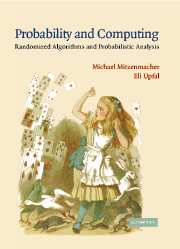Book contents
- Frontmatter
- Contents
- Preface
- 1 Events and Probability
- 2 Discrete Random Variables and Expectation
- 3 Moments and Deviations
- 4 Chernoff Bounds
- 5 Balls, Bins, and Random Graphs
- 6 The Probabilistic Method
- 7 Markov Chains and Random Walks
- 8 Continuous Distributions and the Poisson Process
- 9 Entropy, Randomness, and Information
- 10 The Monte Carlo Method
- 11 Coupling of Markov Chains
- 12 Martingales
- 13 Pairwise Independence and Universal Hash Functions
- 14 Balanced Allocations
- Further Reading
- Index
12 - Martingales
- Frontmatter
- Contents
- Preface
- 1 Events and Probability
- 2 Discrete Random Variables and Expectation
- 3 Moments and Deviations
- 4 Chernoff Bounds
- 5 Balls, Bins, and Random Graphs
- 6 The Probabilistic Method
- 7 Markov Chains and Random Walks
- 8 Continuous Distributions and the Poisson Process
- 9 Entropy, Randomness, and Information
- 10 The Monte Carlo Method
- 11 Coupling of Markov Chains
- 12 Martingales
- 13 Pairwise Independence and Universal Hash Functions
- 14 Balanced Allocations
- Further Reading
- Index
Summary
Martingales are sequences of random variables satisfying certain conditions that arise in numerous applications, such as random walks and gambling problems. We focus here on three useful analysis tools related to martingales: the martingale stopping theorem, Wald's inequality, and the Azuma–Hoeffding inequality. The martingale stopping theorem and Wald's equation are important tools for computing the expectation of compound stochastic processes. The Azuma–Hoeffding inequality is a powerful technique for deriving Chernoff-like tail bounds on the values of functions of dependent random variables. We conclude this chapter with applications of the Azuma–Hoeffding inequality to problems in pattern matching, balls and bins, and random graphs.
Martingales
Definition 12.1:A sequence of random variables Z0, Z1, … is a martingale with respect to the sequence X0, X1, … if, for all n ≥ 0, the following conditions hold:
Znis a function of X0, X1, …, Xn;
E[|Zn|] < ∞
E[Zn+1| X0, …, Xn] = Zn.
A sequence of random variables Z0, Z1, … is called martingale when it is a martingale with respect to itself. That is, E[|Zn|] < ∞, and E[Zn+1| Z0, …, Zn] = Zn.
A martingale can have a finite or a countably infinite number of elements. The indexing of the martingale sequence does not need to start at 0. In fact, in many applications it is more convenient to start it at 1.
- Type
- Chapter
- Information
- Probability and ComputingRandomized Algorithms and Probabilistic Analysis, pp. 295 - 313Publisher: Cambridge University PressPrint publication year: 2005



